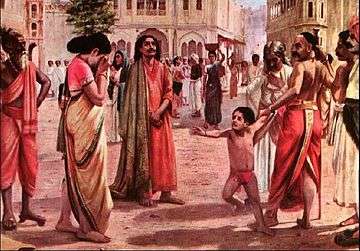Raghuvanshi
Raghuvanshi (or Raghuwanshi) (Sanskrit: रघुवंशी) is an Indian dynasty. And a respected caste among all Kshatriya community. It has been mentioned in Ramayana and Mahabharata the hero of Ramayana Lord Rama was also a raghuwanshi, first mentioned in Indian mythology. Raghuvanshi is believed to be a lineage of kings tracing its ancestry to Surya.[1] Raghuvanshi kings like Mandhata, Harishchandra, Sagara, Bhagiratha, Dilīpa, Raghu, Aja, Dasaratha and Rama.
The clan founder was Vivasvan (विवस्वान) or Vaivaswat Manu (वैवस्वत मनु) who was also known as Arka-tanaya or son of Arka (Surya), is supposed to have lived coeval with the origin of the world. The name Vivaswan literally means "master of the rays"; the sun, or sun-god. The first historically significant king of this dynasty was Vivaswan's grandson Ikshvaku (इक्ष्वाकु). The dynasty is also known as the Ikshvaku dynasty.[2] Raja Prithu was the son of Ikshvaku. Because of the greatness of Raja Prithu(पृथु), the whole planet was known as Prithvi ("Earth").
Kalidasa's famous work, Raghuvansh (Sanskrit: रघुवंश, Raghuvaṃśa) narrates the epic of the Raghuvanshi in 19 sargas (cantos).[3]
Rama
Rama in Ramacharitamanas has menstioned as रघुवीर,रघुराई and रघुनायक.
गुरु गृह गए पढ़न रघुराई| अल्पकाल विद्या सब पाई|| जो रघुवीर होती सुधि पाई| करते नहीं विलम्ब रघुराई ||
and hundred times Lord Rama has mentioned as the heir of Raghu. Lord Rama was the most important king of all Raghu dynasty.
Notables

Several legendary kings came from the Ikshvaku dynasty and after King Raghu, his descendants are known as Raghuvanshi.
- Mandhata (मान्धाता), who is said to have ruled the entire earth during the Vedic period, and defeated the Indra-head of Devatas.
- Aja, Son of King Raghu
- Dasaratha, Son of Aja and father of Rama, Lakshman, Bharath and Shatrughan.
- Ram - He is considered the seventh Avatar of the god Vishnu. He is worshiped by every Hindu. Many Hindus include his name in either their first or last name. Rama's story before he became king of Ayodhya is recounted in the Ramayana. After he ascended the throne, he performed the Ashwamedha Yajna. Bharata, his younger brother, won the country of Gandhara and settled there.
- Lava and Kusha - They were the twin sons of Rama and his wife Sita. Lava ruled south Kosala while Kusha ruled north Kosala, including Ayodhya. Kusha married "Nagkanya" "Kumuddhati", sister of Kumuda. After Kusha the following kings of the solar dynasty ruled Ayodhya:
- Śuddhodana
- Sumitra - He was the last king of Ayodhya from Raghuwanshi dynasty. In the fourth century BC, emperor Mahapadma Nanda of the Nanda Dynasty forced Sumitra to leave Ayodhya. He went to Rohtas with his sons. His son Kurma established his rule over Rohtas
- Sagara, a king who was tricked by Indra into a conflict with the sage Kapila, leading to the death of his 60,000 sons, the descent of the Ganges to earth, and his sons' revival
- Harishchandra, the king of Ayodhya, believed to be an exemplar of honesty
- Dilīpa, said to be the most righteous and chivalrous emperors of the Ikshvaku dynasty
- Raghu II, The mahakavya (epic) composed by the classical poet Kalidasa on the lives of the ancestors of Rama is entitled Raghuvamsha or the "Dynasty of Raghu". The descendants of King Raghu are known as Raghuvanshi. Valmiki Ramayana mention about "Raghukula", a clan of the King Raghu not Rama. Rama himself is known by many appellations (such as Raghava, Raghunandan and Raghukula Nayaka), indicative of his belonging to the family of Raghu.
Modern History
Raghuvanshi are considered as one the most reputed and developed cast of India. Today, most of the Raghuvanshi rajputs live in the state of Rajasthan, Uttar Pradesh, Madhya Pradesh Uttarakhand and Maharashtra. A small number of Raghuvanshi are also settled in various other countries.
See also
References
- ↑ History of Ancient India: From 7300 BC to 4250 BC By J.P. Mittal page 101 onwards
- ↑ Ikshaku tribe The Mahabharata translated by Kisari Mohan Ganguli (1883 -1896), Book 3: Vana Parva: Tirtha-yatra Parva: Section CVI, p. 228 'There was born in the family of the Ikshaku tribe, a ruler of the earth named Sagara (सगर), endued with beauty, and strength...".
- ↑ Raghuvaṃśa of Kālidāsa - Edited with extracts & notes etc by Narayan Ram Acharya Kavyatirtha, Chaukhambha Publishers, Varanasi, 2nd ed (2002), Appendix 2